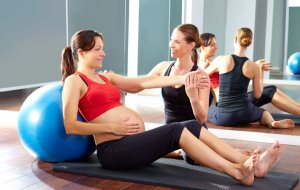Great Pilates Exercises You Can Do During Pregnancy

Exercising during pregnancy brings many benefits for the mother-to-be. Flexibility, breathing control and the strength of various muscle groups are the main ones. In the following article, we’ll list some great Pilates exercises that can be helpful during pregnancy.
A woman whose been practicing Pilates since before she got pregnant doesn’t have to give it up now. It’s one of the greatest benefits of this discipline.
Besides, these exercises are also good preparation for the delivery. They’ll help the mother know how to breathe and feel more relaxed. After the birth, Pilates and its impact on the body’s elasticity will allow for a speedy recovery.
Five great Pilates exercises during pregnancy
In normal situations, practicing Pilates during pregnancy isn’t discouraged during any stage. However, after the second trimester, you will usually start to see the best results, especially when it comes to mobility and relaxation.

Pilates is recommended in the third trimester because it helps the baby to adjust to the correct position for birth. As for the mother, it helps her to regulate her breathing.
Exercise number one
To start with this exercise, you must lay on the floor, facing one side. Flex your knees and put them together.
With your arm extended to the side, inhale and rotate the arm until it’s at a 90-degree angle to the floor. When you exhale, put your arm back in the starting position, with your palm resting on the ground.
Once you control this movement, do it again but rotating your arm completely, until it reaches the other side of your body. To do so, you’ll need to twist your hips a little.
Exercise number two
This exercise is important for stretching the lumbar spine, something that’s essential during the gestation period. To do so, you must get down on your knees on the floor.
Afterward, place a ball or a small bench in front of you. This exercise is about extending your arms to the front and then slowly lowering your back until you make contact with the object.
Two important details: your legs must be apart, so your belly fits in the middle. You shouldn’t flex your arms, and your back must remain straight the whole time.
Exercise number three
It’s necessary that you work your pelvic floor muscles when you’re pregnant. This Pilates exercise can be ideal to help with this.
Lie down with a ball between your legs. Then, inhale slowly and exhale while you press the ball between your knees.
Do ten repetitions of this exercise frequently to strengthen your pelvic floor muscles. Besides this, you’ll also work the inner muscles of your legs and the adductor muscles.
Exercise number four
The starting position with this exercise is lying on your back, flexing your knees and relaxing your shoulders. The first step is to take a breath and slowly exhale while you lift your pelvis. Then, take another breath and lower your pelvis as you exhale.

Repeat this exercise five to ten times. Just like the second exercise, this one will help you stretch your back and alleviate tension in those muscles overloaded with the weight of your belly.
Exercise number five
Cat stretch is the classic Pilates exercise to perform during pregnancy. Doing it is very easy: you must start with your knees on the floor, as well as the palms of your hands as the only support.
Then, stretch your back without arching it and keep your head in line with your spine. Once you’re in that position, lower your chin until you’re looking at the floor.
As a first step, you must inhale deeply. When you exhale, tuck your bellybutton in and close your rib cage.
For women who’ve practiced Pilates for some time, this exercise might be simple. Otherwise, you can practice it to incorporate it gradually.
You need to stretch one leg and extend your opposite arm forward. After five seconds, go back to the start position and do five to ten repetitions on each side, without alternating.
In conclusion, few exercises can be as beneficial as Pilates during pregnancy. It’s a simple and variable discipline: there are many other exercises apart from those we mentioned here. If you’ve never practiced it before, don’t miss the chance to do it!
Exercising during pregnancy brings many benefits for the mother-to-be. Flexibility, breathing control and the strength of various muscle groups are the main ones. In the following article, we’ll list some great Pilates exercises that can be helpful during pregnancy.
A woman whose been practicing Pilates since before she got pregnant doesn’t have to give it up now. It’s one of the greatest benefits of this discipline.
Besides, these exercises are also good preparation for the delivery. They’ll help the mother know how to breathe and feel more relaxed. After the birth, Pilates and its impact on the body’s elasticity will allow for a speedy recovery.
Five great Pilates exercises during pregnancy
In normal situations, practicing Pilates during pregnancy isn’t discouraged during any stage. However, after the second trimester, you will usually start to see the best results, especially when it comes to mobility and relaxation.

Pilates is recommended in the third trimester because it helps the baby to adjust to the correct position for birth. As for the mother, it helps her to regulate her breathing.
Exercise number one
To start with this exercise, you must lay on the floor, facing one side. Flex your knees and put them together.
With your arm extended to the side, inhale and rotate the arm until it’s at a 90-degree angle to the floor. When you exhale, put your arm back in the starting position, with your palm resting on the ground.
Once you control this movement, do it again but rotating your arm completely, until it reaches the other side of your body. To do so, you’ll need to twist your hips a little.
Exercise number two
This exercise is important for stretching the lumbar spine, something that’s essential during the gestation period. To do so, you must get down on your knees on the floor.
Afterward, place a ball or a small bench in front of you. This exercise is about extending your arms to the front and then slowly lowering your back until you make contact with the object.
Two important details: your legs must be apart, so your belly fits in the middle. You shouldn’t flex your arms, and your back must remain straight the whole time.
Exercise number three
It’s necessary that you work your pelvic floor muscles when you’re pregnant. This Pilates exercise can be ideal to help with this.
Lie down with a ball between your legs. Then, inhale slowly and exhale while you press the ball between your knees.
Do ten repetitions of this exercise frequently to strengthen your pelvic floor muscles. Besides this, you’ll also work the inner muscles of your legs and the adductor muscles.
Exercise number four
The starting position with this exercise is lying on your back, flexing your knees and relaxing your shoulders. The first step is to take a breath and slowly exhale while you lift your pelvis. Then, take another breath and lower your pelvis as you exhale.

Repeat this exercise five to ten times. Just like the second exercise, this one will help you stretch your back and alleviate tension in those muscles overloaded with the weight of your belly.
Exercise number five
Cat stretch is the classic Pilates exercise to perform during pregnancy. Doing it is very easy: you must start with your knees on the floor, as well as the palms of your hands as the only support.
Then, stretch your back without arching it and keep your head in line with your spine. Once you’re in that position, lower your chin until you’re looking at the floor.
As a first step, you must inhale deeply. When you exhale, tuck your bellybutton in and close your rib cage.
For women who’ve practiced Pilates for some time, this exercise might be simple. Otherwise, you can practice it to incorporate it gradually.
You need to stretch one leg and extend your opposite arm forward. After five seconds, go back to the start position and do five to ten repetitions on each side, without alternating.
In conclusion, few exercises can be as beneficial as Pilates during pregnancy. It’s a simple and variable discipline: there are many other exercises apart from those we mentioned here. If you’ve never practiced it before, don’t miss the chance to do it!
This text is provided for informational purposes only and does not replace consultation with a professional. If in doubt, consult your specialist.








